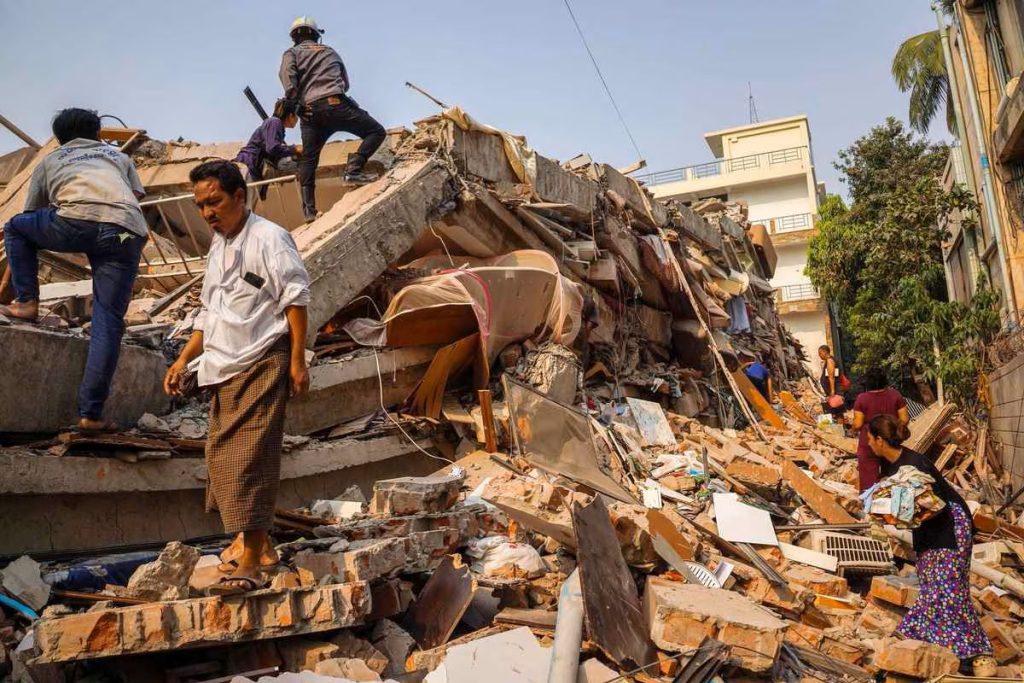
Rescue workers search for victims at the site of a collapsed building in Mandalay, central Myanmar, on March 30.
このページを 日本語 で読む
The damage caused by the massive earthquake in central Myanmar continues to grow.
According to reports, the death toll is already in the thousands. Meanwhile, rescue efforts continue for people trapped under collapsed buildings in Mandalay and other areas near the quake’s epicenter.
A high-rise building collapsed in Bangkok, the capital of neighboring Thailand, and many people are still missing.
In the immediate aftermath of the earthquake, the military junta controlling Myanmar made an unprecedented plea for assistance from the international community. China and Russia, which are close to the junta, have already sent rescue teams. Among Western countries that have distanced themselves from the military regime, the United States has also promised emergency assistance.

Japan has promised to provide around $6 million USD in emergency humanitarian aid through international organizations. It is also sending a medical team. "The Japanese government will stand side by side with the people of Myanmar and deliver humanitarian aid that can directly benefit them," said Chief Cabinet Minister Yoshimasa Hayashi on April 2.
ASEAN also needs to step up relief efforts urgently.
Ending Oppression to Save Lives
The military junta has been isolated from Southeast Asia and the international community since the coup that brought it to power four years ago. However, the critical "72-hour window" for rescue operations following a disaster was reached on the afternoon of March 31. After that, the survival rate of victims falls dramatically.
Now is the time to prioritize saving as many lives as possible. The international community must do everything possible to speed up humanitarian assistance to the people of Myanmar.
Junta leader General Min Aung Hlaing said in a televised statement, "We welcome any organization or country to come and help our suffering people."
The junta should be asked for something in return. If it accepts assistance from abroad, it should immediately stop oppressing its own people. It is also essential that international aid teams be allowed to operate immediately in all disaster zones.

Myanmar's pro-democracy political organization, the National Unity Government (NUG), and other anti-government groups announced they would implement a two-week ceasefire in the affected areas. That began on March 30, allowing rescue operations to take priority.
However, UN Special Rapporteur on Human Rights in Myanmar Tom Andrews has told British media that the military had conducted airstrikes in several areas after the earthquake.
If that is true, it is unforgivable conduct.
Making Sure the Aid Reaches the Victims
There are also justifiable concerns that aid supplies will not reach areas controlled by groups fighting the military government. Humanitarian aid must not be prevented from reaching where it is needed most. The UN should monitor aid efforts to ensure that regional disparities do not develop.
Even though Japan has distanced itself from the military regime, Myanmar is inherently a pro-Japanese country. And the many people from Myanmar who live and work in Japan have been stunned by the devastation their homeland is suffering due to the quake.
Japan has a wealth of experience responding to natural disasters, including major earthquakes. Hopefully, Japan can assist Myanmar in its hour of need.
RELATED:
- Achieving Peace in Myanmar, a Quest In Need of More International Support
- Japan's Response to the Myanmar Junta's Repression Needs to Be Tougher
- China Must Urgently Stop Fraud Hubs Run by Syndicates
Author: Editorial Board, The Sankei Shimbun
このページを 日本語 で読む








